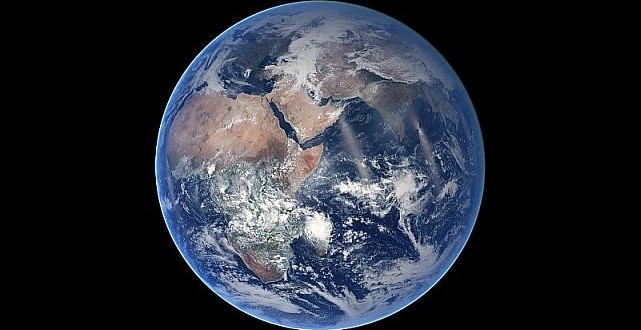The melting of glaciers caused by the world’s rising temperatures appears to be causing a slight slowing of the Earth’s rotation in another illustration of the far-reaching impact of global climate change, researchers said on Friday.
Researchers are studying past changes in sea level in order to make accurate future predictions of this consequence of climate change, and they’re looking down to Earth’s core to do so. “In order to fully understand the sea-level change that has occurred in the past century, we need to understand the dynamics of the flow in Earth’s core” says Mathieu Dumberry, a professor in physics at the University of Alberta.
The connection is through the change in the speed of Earth’s rotation. Melt water from glaciers not only causes sea-level rise, but also shifts mass from the pole to the equator, which slows down the rotation. (Picture the Earth as a spinning figure skater. The skater moves his or her arms in to spin more quickly or out to slow down.) The gravity pull from the Moon also contributes to the slow down, acting a little like a leaver break. However, the combination of these effects is not enough to explain the observations of the slowing down of Earth’s rotation: a contribution from Earth’s core must be added.
One of only a few people in the world investigating changes in Earth rotation, Dumberry contributed his expertise on Earth’s core-mantle coupling to the study. “Over the past 3000 years, the core of the Earth has been speeding up a little, and the mantle-crust on which we stand is slowing down.” As a consequence of Earth rotating more slowly, the length of our days is slowly increasing. In fact, a century from now, the length of a day will increase by 1.7 milliseconds. This may not seem like much, but Dumberry notes that this is a cumulative effect that adds up over time.
Based on their work reconciling these discrepancies, the scientists involved in the study are confident in predicting sea level to the end of the 21st century. “This can help to better prepare coastal towns, for example, to cope with climate change,” says Dumberry. “We’re talking billions of dollars of infrastructure here.” Dumberry notes that this study serves as a stimulus for more work to continue investigating the deep interior of our planet.
The findings, “Reconciling past changes in Earth’s rotation with 20th century global sea-level rise: Resolving Munk’s enigma,” were published in the December 11, 2015 issue of the journal Science Advances.
Agencies/Canadajournal
 Canada Journal – News of the World Articles and videos to bring you the biggest Canadian news stories from across the country every day
Canada Journal – News of the World Articles and videos to bring you the biggest Canadian news stories from across the country every day




NASA just came out a few weeks ago and said the ice caps are growing, not shrinking https://www.nasa.gov/feature/goddard/nasa-study-mass-gains-of-antarctic-ice-sheet-greater-than-losses
Haha!! Good one Sir. They are always trying to spread crap beCause it spreads easily. Thanks for being sharp Sir.